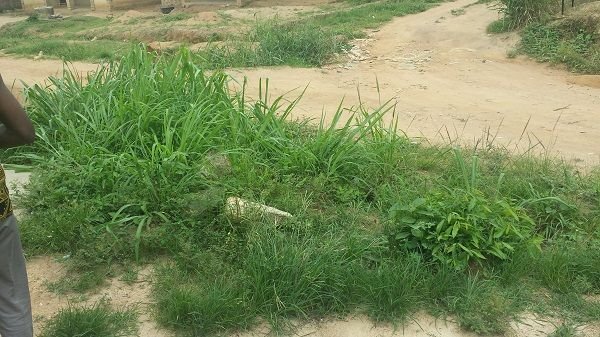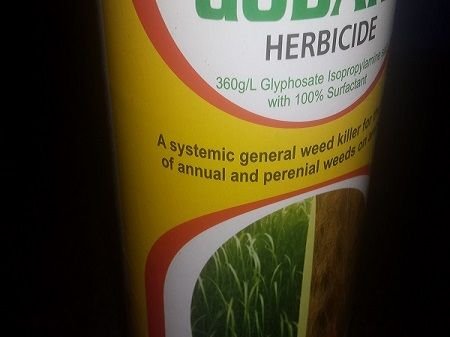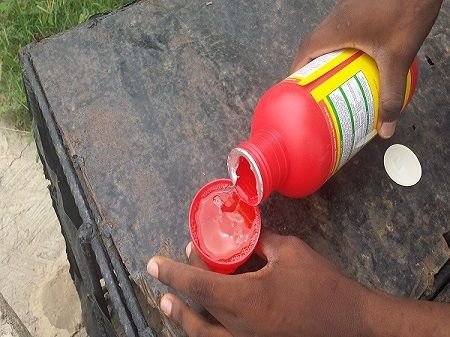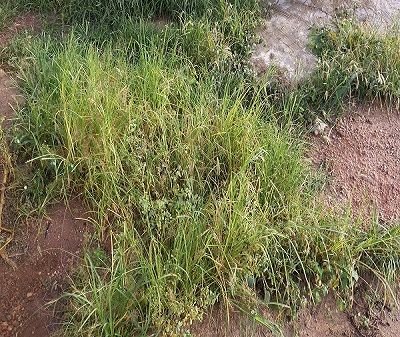Most people that know me in real life know that I am an environmentalist even before taking up a career as a botanist, specializing in ecology. I really cannot stand people destroying/degrading the environment through various activities. I love nature and will do everything within my power to conserve nature and the natural environment as much as possible.

I live in a rented apartment whose surroundings is not tiled nor cemented in any form, so I am reduced to manually clearing the surrounding bush at regular intervals, especially during rainy seasons. I have been doing that for more than a year now. Almost everyone that has seen me toiling and sweating while rigorously moving the cutlass to and fro in the process of clearing the bush questioned my judgement of opting for manual labouring when I can just get herbicide and spray the shit out of the troublesome weeds.
For clarity sake, the herbicide is a type of pesticide that is specifically used to kill unwanted plants in form of weeds. Herbicide was derived from two words; 'herb' which mean plants and 'cide' which means to kill. There are wide varieties of herbicides based on how they function, their chemical constituents and the group of plants they are effective on.
Some herbicides operate by inhibiting the synthesis of acetyl CoA carboxylase , a substance that is key in the metabolic process of lipid synthesis within the plant's body. Lipid as a biomolecule is an important component of the plant's cell membrane which acts as a selectively permeable interface in the movement of substances in and out of the cell. However, it is pertinent to note that only acetyl CoA carboxylase of grasses are grass and monocotyledonous plant species are sensitive to this group of herbicide, that of the dicotyledonous plants are immune to it.


Apart from disruption to the process of cell membrane synthesis, some herbicides operate by indirectly inhibiting the synthesis of branched-chain amino acids such as valine, leucine and isoleucine. The process is carried out through the inhibition of acetolactase synthase enzyme which happens to be the first step in the synthesis of the named amino acids. Hence, the synthesis of deoxyribonucleic acids within the various cells is gradually stalled due to the unavailability of the branched-chain amino acids. Unlike the herbicides that inhibit acetyl CoA carboxylase which has effect only on monocotyledonous plant species, this group of herbicides exert their effects both on monocots and dicots. In addition, this group of herbicides is considered one of the safest to use since the acetolactase synthase pathway only exist in plants and not in animals.
Other group of herbicides include but not limited to those that act as inhibitors of photosystem I and II thereby disrupting the process of electron transfer within the cells of the plant, inhibitors of enolpyruvlshikimate-3-phosphate synthase enzyme which is a precursor in the synthesis of tryptophan, phenylalanine and tyrosine and inhibitors of 4-hydroxyphenypyruvate dioxygenase which is an enzyme involved in the metabolism of tyrosine.
Not that I do not know about the use of herbicides which seems to be an easier, more efficient and time-saving option for me instead of the mechanical methods I have been using all these while. Like I said earlier, the ecological/environmental impacts of the various chemicals that make up the varieties of herbicides in the market is the sole reason I have never opted to use it. Some of the impacts that have been deterring me include;
Depending on the chemical formulation, some herbicides persist in the environment even after carrying out their intended functions. As such, they can become leached deep into the soil and enters the underground water tables, contaminating wells and municipal water system. Sometimes, the persistent herbicides get washed away into a nearby aquatic environment where they become poisonous to fishes and other aquatic organisms. In addition, these group of herbicides might not only kill weeds but also untargeted animals living in the same habitat.
The use of herbicides can cause a shift in the diversity of plants and animal species within the habitat from broad herbicide-susceptible species to a narrow herbicide-resistant species due to the process of natural selection as postulated by Darwin. According to the theory of natural selection, repeated use of herbicides may cause the death of weak species and emergence and multiplication of the few strong species which become the dominant species over time. As such, the herbicides will cease being effective in the killing of the weed species and the total plant biodiversity would have been narrowed.
However, considering the fact that I hardly get time to mechanically remove the weeds around my apartment recently, I decided to try the herbicide option. I went to the nearby agrochemical merchant, a semi-illiterate man in his late 60s or early 70s by my estimate. I demanded to buy a herbicide but his reply got me a bit confused.
What type would you like? Rapid action or slow action?
From what I have learnt before-hand, I knew I would be needing a herbicide that would be effective in killing both grasses (monocots) and broad-leaf species (dicot). While some are differential, some are specific. This enables farmers to be able to select herbicide of their choice in cases of crop/weed mixture, the crops need to be spared while the weeds need to go. For example, in a maize field where the majority of the weeds are broad-leafed/dicots species, a herbicide that is specific for killing broad-leaf species would be preferred in order to keep the maize plant safe from the harmful effect of general herbicides. If the reverse is the case, a herbicide specific for killing monocots/grasses would be ideal. In a farm where a multi-cropping farming system is in practice, the farmer would have to compromise by either using mechanical means of removing the weeds or find a way to protect the crops from getting in contact with the herbicide.
Some herbicides just need to be in contact with the various plant organs in order to function. Through the organ, they penetrate into various tissues and cells and initiate their various modes of actions. The action of such herbicide is rapid and their effects are also as such. They are generally referred to as contact herbicides. On the other hand, some herbicides need to get to the soil where they are translocated through the roots to the system of various plants before initiating their mode of action. The effects of such herbicides last a while longer than that of their rapid action counterparts. They are generally called systemic herbicides.


Back to the response of the agrochemical merchant. I had to think of the best way to explain the exact herbicide I want. I told him I want something that is general (kills monocots and dicots), not poisonous to animals and something whose effects last a while in the environment (will take the weeds some time to grow back). I wanted a systemic herbicide that is generally safe for untargeted organisms in the environment.I also made up my mind never to use the herbicide repeatedly to avoid the ugly situation of a shift in species diversity as well as avoid the evolution of herbicide-resistant species by natural selection. To an extent, I had all my worries taken care of.
I bought the brand offered by the merchant along with a 16L sprayer and headed home. I took my time to read through the label on the herbicide container and to my surprise, there is no instruction as to how to mix (need I say the content is liquid?). I decided to google the brand but could not get the required information, so I took a gamble. I mixed two capfuls of the chemical and mix it with 16 litres of water, sprayed the weeds surrounding my apartment around 10:00 am and then waited in observation.


I am used to seeing the significant effects of herbicides on vegetations as short as the first day of application, especially if the herbicide has been applied early in the morning and it happened to be a sunny day. Towards the setting of the sun, I scrutinized the vegetation around my house for the effects of the herbicide but could not see any. The following day, I observed the same trend and I practically concluded that the percentage by volume of the herbicide used was too low for the spraying to have any effect.
Wait! Not so fast..
I had given up on the effectiveness of the initial spraying and already planning on carrying out another round of spraying with a higher concentration of the herbicide when at the end of the fourth day, I noticed a slight yellowness of some patches of the vegetation (or was it my eyes?). I really cannot say at this point that I got the concentration right. I am still in the process of observing, today being the 5th day and not much changes have been observed that is different from that of the fourth day (see the pic above).
Does systemic action means taking days before the effects start showing?
The observation continues.....
Thank you for reading.
References
All images were taking using my samsung S4 mobile phone
If you write STEM (Science, Technology, Engineering, and Mathematics) related posts, consider joining #steemSTEM community on discord here


This is a sensitising post about the way we treat the flora in our environment. The fact is that humans need to change their way of ruining the ecosystem with chemicals before we ruin ourselves and that will be irredeemable.
There was a time I washed my newly acquired mosquito net and pour the water in a piece of land infested by termites in front of my house. Few days later, I discovered the termites were gone. I just wonder if it is not the work of the chemical water I poured on them. Please you need to make a post on that too. What are the health risk of this mosquito nets we sleep under?
I will upvote and resteem this post to educate my people.
Meanwhile, you might want to see what I am doing as well, here is one of my posts. You will enjoy it if you are a fan of science fiction.
https://steemit.com/science-fiction/@ojebaba/the-man-eating-plant-conspiracy
Thank you for your thoughtful input. I will conduct a little literature review to see if those chemicals in mosquito nets were responsible for the demise of the termites as well as the risk associated with using the mosquito net. UNless people are sensitized on the implications of their actions on the environment, I do not see the trend in environmental degradation reversing anytime soo. Thanks for the support
Hello :)
Although, I was aware about this to some extent, I still find this really scary @gentleshaid
However, for me, the most insightful part of your post was the observation you made about how herbicides interfere with natural selection! :(
Thank you for sharing this information with us.
Take care my dear :*
The use of herbicides is now a growing phenomenon in Nigeria. People in droves are going after it. I have always known that it is not the best thing for the environment. But it is a very fast and easy way of controlling weeds.
hey @abigail. Thank you for coming around again :). My spirit is always lifted each time I see you around my blog.
The environmental effects of herbicides have actually been lessened through continous research on their safe use. I hope that one day, we wont have to think twice about their usage.
Thanks once again and I do hope you are fine.
Yes, @greenrun, it's faster, easier, less stressful and cheaper(than paying this abokis), yea, it has its negative effects. But this is Nigeria where nobody cares, where our President is going on a leave, chai!, where are our President are calling us lazy. So we would continue using the pesticide since our President said we are lazy. But honestly is the country that's making us use it, no proper developmental plans, only few places are planned, and in those places pesticides are prohibited, like Ikeja, banana inland,etc.
@menoski, I do agree it's faster :)
Thanks for sharing. This whole topic is so complex. Here in Europe pesticides/herbicides are at the moment a big topic as the EU is about to make a decision concerning those remidies, specially which contain Neonicotinoide. Last year a German/English/ Netherland study showed that 76% of the insect population in Germany disapeared due to the haevy use of pesticides/ herbicides in agrobusiness. Bee population is massively under pressure.
I don't know your place, but I wonder why you want to get rid of the grass in the first place? If only because of aesthetic reason, maybe you let it grow, keep it short and enjoy the tiny flying brothers and sisters in it.
76% is quite massive and scary and something drastic needs to be done. I do not know if such research has been carried out around here. We might end up causing significant ecological imbalance by their continued use. I think the only reason I want the weeds out is aesthetic, not really because of myself but those around me that would refuse to understand their ecological use. This might be the first and the last time I will be using the herbicide though, like I said, it is just an experiment.
You are definitely an open minded person, trying to find out by your own. There is so much reseach done about this topic. Most of it by big chemical companies which of course will tell you that everthing is fine with their products. And they want to sell them! A lot of products which are already forbidden in US or Europe get sold very well in developing countries where proper information is available only for few educated people.
you are quite right. Several environmentally dangerous products find their ways to Africa and other developing countries. A medium as this is one of the ways sensitization can take place. perhaps I will research some of the products and make post on it.
I think the brighter the sun the faster herbicides work. Cause I notice when I use it, the grasses under shades don't wither as fast as those exposed to the sun directly.
right. that could also be a factor
Wow! I love practical posts..This is an awesome experiment..I can remember how tedious it is to use machete or hoe on those stubborn grasses.
The use of herbicide is becoming popular around now. I haven't used one tho..My last encounter with it wasn't good though. The smell almost choked me!
From your experiment, I think the herbicide hasn't fully gotten absorbed by the grasses or hasn't reached the toxic levels at the site of action. It might be a function of your mixture too as well
Well done, we equally wait on the observation results
I am as curious as you. Funny enough, this particular is quite odourless. I was expecting some irritating smell while using it but none came.
thanks for reading through.
Cool..that makes it less an environmental hazard...How is it faring now
Always a pleasure
Lovely post. I'm also a lover of nature. Pesticide is the best way to get those unwanted off our land in Nigeria. Sometimes it takes a week before the effects begins to show, thats during raining season, because of little sun light. Raining season is about, this is the kind of post we need to prepare ourselves. Nice post @gentleshaid
Thank you. The scientist in me is always on alert. Pesticides are good innovations but unless environmental friendly ones are developed, we could be doing a long term damage to the environment and ourselves.
Using herbicides is not new in this part of the world but a lot of people do not know the implications of using them. They just use it to "kill" the grass and not considering what else they are killing.
Very interesting post sir, i enjoyed every bit of it.
Cheers!
Thank you @rharphelle. We scientists need to create awareness within our immediate environment. There is an adage in my language that says if your roommate is eating bad insects and you keep unlooking, his midnight snoring will disturb your sleep.
I have weeds growing everywhere in my place. I think I may try the herbicide means of control. Any idea how long the weeds stay dead?
it depends on the type of herbicide you opt to use. SYstemic herbicides have a more long-lasting effect compared to contact herbicides, though more expensive.
I am going out on a limb here to guess, is systemic the one that attacks the root while contact attack when it gets in contact with the leaves? How much (in naira) are both? I am seriously considering buying one. Thank you.
That was a very interesting post @gentleshaid!
I have to admit I share the same passion as you about nature and I'm all about preserving and protecting the natural environment at all costs!
I might go pick up rubbish dumped in the mountains and organize small teams in order to clean up our beaches.
By the way why would you want to kill those weeds and bushes! Aren't they lovely?
Kidding, I know it might be trouble!
Keep up the quality work!
Much as I love nature, we all know that weeds would always be weeds with their annoying tendencies and their ability to house dangerous animals which are not suitable around the house. How I wish everyone can be as passionate about the environment as you to the extent of cleaning up the beaches voluntarily. I have learned few things from you though and might adopt the same approach around here. Thanks for coming around
Around the world today, the usage of herbicides now seem to be taking over other than the manual clearing of weeds. In future, i believe we could see herbicides used on farmlands distinguishing plants from weeds. dreaming maybe, but think of it, how would it look like when we spray herbicides in farmland and it kills the weeds and nourishes only the plant...Science. nice information Sir
I am glad to inform you that it is already happening. The herbicide I used here is a general one. There are herbicides that are specific for broad leaf plants and those specific for grasses. If you plant maize for example, you can use herbicides specific for broad leaf plants in your farm without worrying about killing the maize crops.
wow! Thats good to know...I was thinking it has not been implemented...Science ever
Haha... Stop clearing this unwanted plants yourself, herbicides do a lot of work, i remember when my dad started using it in our compound. I thought it wasn't going to work since rain fell the same day he applied it.. But it still worked.
I enjoyed this.
but herbicides have their negative sides. Perhaps not in the short term, but they do have serious negative sides in the long term
I once happened to witness a farmer that just discovered that all the fish in his ponds are dead due to something like this, it wasn't a pretty sight. I've learnt a lot from this, well done Sir.
poor fishes. A lot of our actions have ecological implications